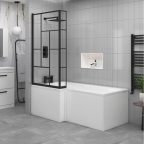
Essential Heating Appliances Every Home Needs
In order to keep your home warm and cosy, your clothes fresh and dry, as well as to be able to enjoy hot showers, you’ll more than likely need heating and gas appliances to make it happen.
With a number of different options available, it’s important to choose the right appliances. Different appliances have different pros and cons and are suitable for different use cases. Not everyone’s household needs and preferences will be the same.
In this article we’ll be taking a look at some different types of gas and heating appliances, discussing the likes of boiler and radiator varieties as well as their pros and cons, maintenance information and the importance of professional installation.
Boilers
Boilers are integral to a home, keeping both you and your water warm via what’s typically known as central heating. There are several different types of boilers, with each type working a slightly different way - making it suitable for different needs. In the UK, any kind of gas appliance installation, including boilers must be handled and maintained by a professional who is Gas Safe registered.
Each of them have their pros and cons, and require a yearly service to remain in warranty. Boilers can typically last up to 15 years before needing an upgrade, but like anything, this can vary. Breakdowns do happen after all.
Here are each of the three main types of boiler explained:
Combi Boiler
A combi boiler is a very popular choice of boiler. They are compact and can provide hot water on demand, which eliminates the need for a hot water storage tank – further adding to the compact element.
Combi boilers are a great choice for smaller homes or homes that only have one bathroom, or will at least only have one shower or other plumbing based system used at once.
One of the biggest cons of combi boilers is that they may struggle to provide hot water to multiple places simultaneously….
…So if you have a bigger household where multiple users will both need to get showers (in separate showers) at the same time – or you’ll want a shower whilst someone else decides to do the washing up at the same time – a combi boiler may not be the best choice for you.
They are, however, a modern and energy efficient option. Which could potentially lower your energy bills.
System Boilers
Almost the complete opposite to combi boilers, system boilers are ideal for homes with multiple bathrooms and require a hot water storage tank. This means they’ll take up more space.
Conventional Boiler
As the “conventional” part of the name implies, these kinds of boilers are suited to homes with traditional heating systems with high hot water demand.
They require both a hot water cylinder and a cold water storage tank, which means they’ll take up a fair bit of space in your home.
These will be best for bigger, older, and more populated homes.
It might be worth noting that as new models of each of the three main boilers release over time, they’ll each be more efficient with improved function and energy saving.
Radiators
Radiators used to all be pretty standard and similar looking, but as time has passed new designs have been released. Though there are some electric models, many radiators are connected to your boiler in order to provide central heating throughout your home.
You can control levels or turn off radiators completely, usually using a valve. Some even have smart features now. Either way, it’s good to turn down or turn off radiators in little used rooms for energy and money saving purposes.
Here are some common types of radiator:
Panel Radiator
The most common, classic style of radiator, these are usually horizontal rectangles or squares of varying sizes.
They are affordable, widely available and easy to install, but might be outdated compared to some interior styles.
Towel Radiator
These can heat rooms but are also primarily designed for hanging towels and clothes on to dry. These can be installed in bathrooms in place of panel radiators. You can also get electric versions of these, in order to work independently from your boiler and heating.
Column Radiators
These types of radiators have a more modern aesthetic appeal, with some models coming in vertical editions. However, column radiators can often be more expensive, heavier, and more challenging to install – meaning you’re more likely to require a professional.
Radiator Maintenance
With most radiator types, some regular maintenance will be required. This includes cleaning, dusting, bleeding to remove air pockets (this will maximise heating efficiency).
You may need a professional plumber to perform a powerflush, using expert-only chemicals.
Final Thoughts
And that sums up your main options for central heating options. By assessing your household’s needs and utilising this information, you’ll be able to pick out heating solutions that will suit you perfectly.













